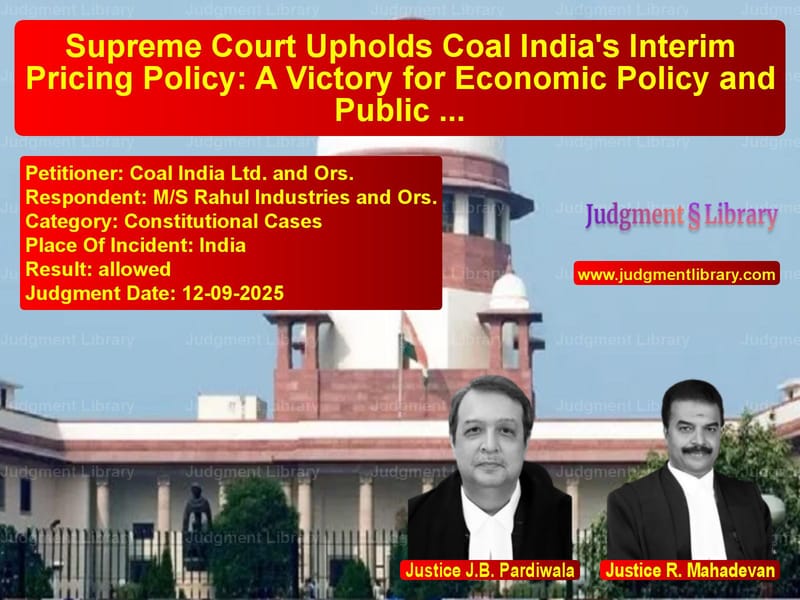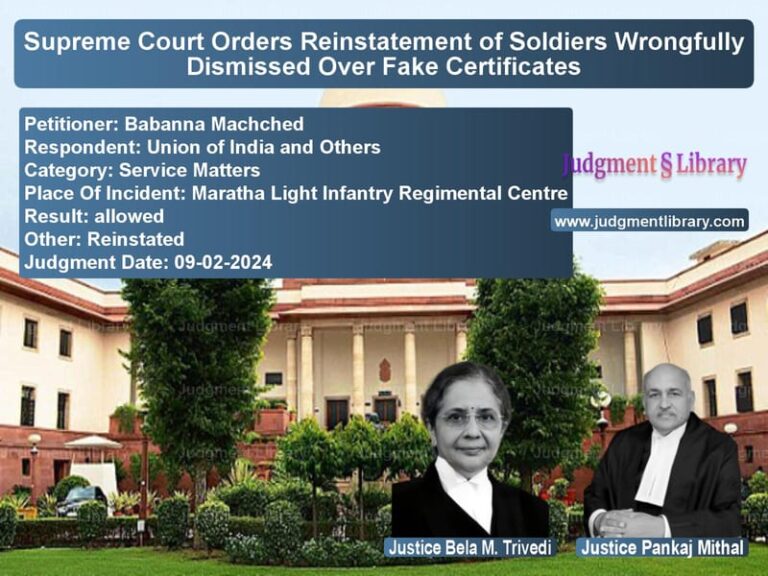Supreme Court Upholds Coal India’s Interim Pricing Policy: A Victory for Economic Policy and Public Interest
In a significant judgment that balances economic policy with constitutional principles, the Supreme Court of India has overturned the Calcutta High Court’s decision and upheld Coal India Limited’s Interim Coal Policy of 2006. The case, which pitted private industries against the public sector giant, revolved around a 20% price increase for non-core sector consumers during a transitional period in India’s coal distribution system.
The legal battle began when M/s Rahul Industries and other manufacturers of smokeless fuel challenged Coal India’s decision to charge 20% more than the previously notified prices for linked consumers in the non-core sector. The interim policy was introduced on December 15, 2006, following the Supreme Court’s striking down of the e-auction system in the landmark Ashoka Smokeless case.
Justice J.B. Pardiwala, delivering the judgment, emphasized the limited role of courts in economic policy matters. The Court stated: “Price fixation is neither the function nor the forte of the court. We concern ourselves neither with the policy nor with the rates.” This principle, drawn from earlier precedents, formed the foundation of the Court’s approach to the case.
Read also: https://judgmentlibrary.com/supreme-court-launches-nationwide-disability-rights-monitoring-project/
The Historical Context of Coal Distribution
To understand the significance of this judgment, one must appreciate the historical context of coal distribution in India. The coal sector was nationalized in the early 1970s through the Coking Coal Mines (Nationalization) Act, 1972 and the Coal Mines (Nationalization) Act, 1973. This led to the creation of Coal India Limited as the primary manager of India’s coal mining operations.
Consumers were broadly categorized into core and non-core sectors based on their role in economic development. Core sector industries including power, steel, cement, defense, and fertilizers accounted for over 95% of coal consumption. The remaining industries, including manufacturers of smokeless fuel like the respondents, comprised the non-core sector.
The distribution system evolved through various phases – from the linkage system to open sales schemes, and eventually to the e-auction system introduced in 2003-04. When the Supreme Court struck down the e-auction system in Ashoka Smokeless (2007), it created a regulatory vacuum that Coal India sought to fill through the Interim Coal Policy.
The Legal Battle Unfolds
The respondents challenged the Interim Coal Policy before the Calcutta High Court on multiple grounds. They argued that Coal India had no authority to frame the policy without following the procedure prescribed in Ashoka Smokeless, which directed the formation of an expert committee to evolve a viable coal distribution policy.
The manufacturers contended that “the 20% price increase merely permitted the appellant to enhance its profit margins at the cost of linked consumers of the non-core sector which constituted about 1% of the entire consumer base of coal.” They also argued that the hike was arbitrary and violated Article 14 of the Constitution since no similar increase was imposed on core sector consumers.
The Calcutta High Court accepted these arguments and struck down the Interim Coal Policy, ordering refund of the 20% additional amount with interest. Coal India appealed to the Supreme Court, arguing that the High Court had overstepped its judicial boundaries.
Coal India’s Defense
Before the Supreme Court, Coal India presented a multi-pronged defense. The appellants argued that price fixation is essentially a legislative function and courts should not interfere with economic policy decisions. They emphasized that “the courts ought not to interfere in policy decisions as well as the fixation of rates.”
The company justified the differential pricing by highlighting the distinct characteristics of core and non-core sectors. Core sector industries served essential public needs – electricity, steel, cement – and any price increase for them would have a cascading effect on the entire economy. In contrast, non-core sector products were not of everyday concern for the common man.
Coal India also argued that the 20% increase was necessary to mitigate operational cost increases of 23.84%, though it only addressed 1.2% of this increase. The company submitted that “the objective of increasing the price of coal for the non-core linked sector by 20% was to mitigate the increase in operational costs so as to maintain an adequate supply of coal in the market.”
The Supreme Court’s Constitutional Analysis
The Supreme Court engaged in a detailed analysis of constitutional principles governing price fixation of essential commodities. The Court examined its earlier decisions in Ashoka Smokeless and Pallavi Refractories to determine the permissible scope of differential pricing.
Justice Pardiwala observed: “Though dual pricing is permissible… yet the principles of price fixation of essential commodities are required to be kept in mind to ensure that the constitutional and statutory goals enshrined in Article 39(b) and Act, 1955 respectively, are met.”
The Court clarified that while the State and its authorities cannot be actuated solely by profit motive, they are not barred from earning reasonable profits. The judgment noted: “It was clarified that the concept of distributive justice contained in Article 39(b) and the Act, 1955 placed an obligation on the State to ensure a fair price for the consumers. Such fair price cannot be taken to mean the least possible price without due regard for operational and production costs.”
Rational Nexus Test Applied
The Court applied the “rational nexus test” to examine whether the classification between core and non-core sectors was reasonable. It found that the classification was based on intelligible differentia having a rational relation to the objective of the policy.
The Court observed: “Core sector industries constituted nearly 90% of the entire consumer base of the appellant company herein and their usage of coal was of paramount importance to nation-building activities.” Any price increase for these sectors would affect essential commodities and services used by the general public.
In contrast, “increasing the price of coal for industries in the non-core/unlinked sector that were involved in the production of goods such as paint, lime, etc. would not result in an adverse cost impact on the end consumers, as such products are not of everyday concern for the common man.”
On Judicial Restraint in Economic Matters
The Supreme Court strongly emphasized the principle of judicial restraint in matters of economic policy. Quoting from its earlier decisions, the Court stated: “Wisdom and advisability of economic policies are ordinarily not amenable to judicial review unless it can be demonstrated that the policy is contrary to any statutory provision or the Constitution.”
The judgment further elaborated: “In the case of a policy decision on economic matters, the Courts should be very circumspect in conducting any enquiry or investigation and must be most reluctant to impugn the judgement of the experts who may have arrived at a conclusion unless the Court is satisfied that there is illegality in the decision itself.”
Refund and Unjust Enrichment
Although the Court’s validation of the Interim Coal Policy made the refund question moot, it nevertheless addressed the issue of unjust enrichment. The Court expressed concern that granting refund without establishing whether the industries had absorbed the cost increase or passed it on to consumers would result in unjust enrichment.
The Court noted: “The burden of proof for showing that the excess amount has not been passed onto the end consumers, could have been satisfied only when the respondents brought on the record, a detailed description of all the transactions against which they wanted refund.”
Since most respondents failed to provide complete evidence, the Court found merit in Coal India’s apprehensions about unjust enrichment.
Broader Implications
This judgment reinforces the principle of separation of powers and judicial deference to executive decision-making in economic matters. It establishes that courts will not substitute their wisdom for that of policy experts unless there is clear violation of constitutional or statutory provisions.
The decision also clarifies that public sector undertakings, while being instruments of the State, are not prohibited from earning reasonable profits, especially when such profits are necessary for maintaining operations and ensuring supply of essential commodities.
By upholding the differential pricing between core and non-core sectors, the Supreme Court has acknowledged the government’s need to balance competing interests in the distribution of natural resources. The judgment recognizes that in a developing economy, certain sectors may legitimately require preferential treatment to serve larger public interests.
The Court’s approach in this case demonstrates a nuanced understanding of the complex interplay between constitutional principles, economic realities, and administrative exigencies. It strikes a balance between protecting individual rights and allowing the government necessary flexibility in economic governance.
Petitioner Name: Coal India Ltd. and Ors..Respondent Name: M/S Rahul Industries and Ors..Judgment By: Justice J.B. Pardiwala, Justice R. Mahadevan.Place Of Incident: India.Judgment Date: 12-09-2025.Result: allowed.
Don’t miss out on the full details! Download the complete judgment in PDF format below and gain valuable insights instantly!
Download Judgment: coal-india-ltd.-and-vs-ms-rahul-industries-supreme-court-of-india-judgment-dated-12-09-2025.pdf
Directly Download Judgment: Directly download this Judgment
See all petitions in Fundamental Rights
See all petitions in Constitution Interpretation
See all petitions in Public Interest Litigation
See all petitions in Separation of Powers
See all petitions in Contract Disputes
See all petitions in Corporate Governance
See all petitions in Judgment by J.B. Pardiwala
See all petitions in Judgment by R. Mahadevan
See all petitions in allowed
See all petitions in supreme court of India judgments September 2025
See all petitions in 2025 judgments
See all posts in Constitutional Cases Category
See all allowed petitions in Constitutional Cases Category
See all Dismissed petitions in Constitutional Cases Category
See all partially allowed petitions in Constitutional Cases Category







